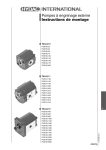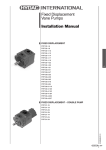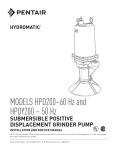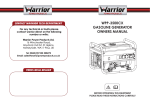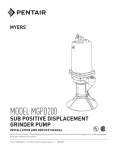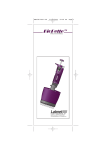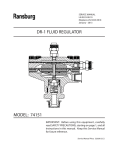Download External Gear Pumps Installation Manual
Transcript
External Gear Pumps Installation Manual SIZE 0 PGE100-25 PGE100-30 PGE100-50 PGE100-75 PGE100-100 PGE100-125 PGE100-150 PGE100-175 PGE100-200 SIZE 1 PGE101-100 PGE101-125 PGE101-160 PGE101-200 PGE101-250 PGE101-315 PGE101-365 PGE101-420 PGE101-500 PGE101-610 PGE101-740 6 PGE102-450 PGE102-630 PGE102-820 PGE102-1000 PGE102-1130 PGE102-1200 PGE102-1400 PGE102-1500 PGE102-1600 PGE102-1730 PGE102-1900 PGE102-2200 PGE102-2500 PGE102-2800 E 2.910.M.0/02.14 SIZE 2 487 SIZE 3 PGE103-2000 PGE103-2250 PGE103-2500 PGE103-2800 PGE103-3200 PGE103-3600 PGE103-4200 PGE103-4600 PGE103-5000 PGE103-5500 PGE103-6000 MULTIPLE PUMPS PGE104Stage 1 100 125 160 200 250 315 365 420 500 610 740 Stage 2 100 125 160 200 250 315 365 420 500 610 740 Stage 3 100 125 160 200 250 315 365 420 500 610 740 Size 2 450 630 820 1000 1130 1200 1400 1500 1600 1900 2200 2500 450 630 820 1000 1130 1200 1400 1500 1600 1900 2200 2500 450 630 820 1000 1130 1200 1400 1500 1600 1900 2200 2500 Size 3 2000 2250 2500 2800 3200 3600 4200 4600 5000 5500 6000 E 2.910.M.0/02.14 Size 1 488 / 2000 2250 2500 2800 3200 3600 4200 4600 5000 5500 6000 / 2000 2250 2500 2800 3200 3600 4200 4600 5000 5500 6000 Before using the product, make sure you read and understand all the instructions in the Operator‘s Manual entirely. In this catalogue, safety precautions are classified under three headings: DANGER, WARNING, and CAUTION. These words are defined as follows: DANGER Indicates an imminent danger that is very likely to cause death or severe injury unless the situation is avoided. WARNING Indicates a potential danger that may cause death or severe injury unless the situation is avoided. CAUTION Indicates a potential danger that may cause a minor or moderate injury or that may result in property damage. INFORMATION Indicates useful hints and system tips. They are necessary for correct installation and safe use of the product. PRECAUTIONS FOR USE CAUTION 1. To avoid possible injury when handling the products, wear protective safety equipment in accordance with the instructions in the Operator’s Manual. CAUTION 2. Failure to support the weight of the product or lifting the product with incorrect posture may result in injury to the hands or back. Be sure to follow the instructions in the Operator's Manual. CAUTION 3. Do not climb on, strike, drop or exert unnecessary force on the product.This may lead to injury or fire due to incorrect operation, damage, or oil leakage. CAUTION 4. Oil on the product or floor must be cleaned up thoroughly. Oil could cause you to drop the product or slip on the floor. PRECAUTIONS FOR INSTALLATION, REMOVAL, AND MAINTENANCE WARNING 1. All installation, removal, maintenance, piping or wiring work should be carried out by properly trained personnel. WARNING 2. Before beginning any installation, removal, maintenance, piping or wiring work, the following procedures must be carried out. Failure to do so may cause the equipment to move suddenly or oil to spill during the work, which may result in serious accidents. zzShut off the power supply to the equipment and make sure that all the electrical motors and machines cannot restart unintentionally. zzSecure the cylinder rods before installing/removing the cylinder. zzReduce the pressure in the pipes and cylinders in the hydraulic system to zero pressure. WARNING 3. Before working on any electrical wiring, be sure to shut off the power supply. Failure to do this may cause an electric shock. CAUTION 4. Keep all installation holes and surfaces clean. Failure to do this may cause insufficient tightening of the bolts which may lead to a fire due to oil leakage. 6 CAUTION 5. Before commissioning the device, make sure that all bolts are tightened with the specified torque. Failure to comply with the specifications may cause incorrect operation, damage, oil leakage, etc. E 2.910.M.0/02.14 To prevent serious accidents, equipment damage, and other property damage, please observe the following precautions, as well as all related regulations regarding safety. 489 PRECAUTIONS FOR OPERATION DANGER 1. Never operate any device in an environment where there is danger of explosion or fire, unless the device is fully protected. This may lead to major and serious accidents including explosion or fire. WARNING 2. Do not approach the pumps or motors when in operation. Hands or clothes can be caught up and wound into the pumps and motors which can lead to serious injury. WARNING 3. In event of abnormal operation (unusual sounds, oil leakage, smoke, etc.), immediately stop operation and take appropriate corrective measures. WARNING 4. Completely discharge air from the cylinder at low pressure. Failure to do so may result in unexpected movement of the cylinder, which in turn may cause injury. WARNING 5. To adjust the damping, gradually increase the cylinder speed from a low speed (50 mm/s or less). Rapidly accelerating the cylinder may produce an abnormal pressure surge, resulting in damage to the cylinder or the machinery and causing a serious accident. WARNING 6. Before operating this device for the first time, check that hydraulic and electrical circuits are properly connected and that adjoining surfaces are tightly aligned. WARNING 7. Do not use the product outside of the specifications described in the catalogue, related data sheets, drawings, etc. Failure to adhere to them may cause incorrect operation, damage or injury. WARNING 8. During operation, high temperatures in the hydraulic system or solenoid valves may occur. Wear protective equipment on hands and body when in the vicinity of these devices. E 2.910.M.0/02.14 WARNING 9. Always operate the device with clean oil, and within established ranges for temperature, viscosity and cleanliness. Failure to adhere to the specified limits may result in incorrect operation or fire due to oil leakage. 490 GENERAL PRECAUTIONS WARNING 1. Never modify the device. If any alterations are made, unexpected machine movement may cause injury. CAUTION 2. Do not disassemble the products without prior consent of the manufacturer. Failure to adhere to this can cause the products to operate incorrectly which can lead to accidents or damage. CAUTION 3. For transportation / storage of the product, pay attention to environmental conditions, such as ambient temperature and humidity, and implement anti-dust / anti-corrosion measures. CAUTION 4. The seals may need to be replaced if the product is used after long-term storage. CAUTION 5. Read the manual thoroughly and ensure that the seals are replaced properly. RELATED REGULATIONS CAUTION To ensure that this product is used in a safe manner, it is essential to observe the above precautions, as well as all related regulations regarding safety. EXTERNAL GEAR PUMPS Technical specifications Size 0 Series Geometric displacement [ccm/rev] Operating pressure Rated [bar] Intermittent [bar] Peak [bar] PGE100-25 0.25 200 PGE100-30 0.30 210 PGE100-50 0.50 PGE100-75 0.75 PGE100-100 1.00 210 PGE100-125 1.25 210 PGE100-150 1.50 PGE100-175 1.75 PGE100-200 2.00 170 145 130 200 175 160 230 Maximum drive speed [rpm] 3500 230 200 180 170 3000 2500 2000 Size 1 Operating pressure Rated [bar] Intermittent [bar] 250 280 Peak [bar] Maximum drive speed [rpm] PGE101-100 1 PGE101-125 1.25 PGE101-160 1.6 PGE101-200 2 PGE101-250 2.5 PGE101-315 3.15 PGE101-365 3.65 PGE101-420 4.2 PGE101-500 5 PGE101-610 6.1 200 220 230 2500 PGE101-740 7.4 170 190 200 2500 300 3500 6 3000 E 2.910.M.0/02.14 Series Geometric displacement [ccm/rev] 491 Size 2 Series Geometric displacement [ccm/rev] PGE102-450 4.5 PGE102-630 6.3 PGE102-820 8.2 PGE102-1000 10 PGE102-1100 11.3 PGE102-1200 12 PGE102-1400 14 PGE102-1500 15 PGE102-1600 16 PGE102-1730 17.3 PGE102-1900 Operating pressure Rated [bar] Intermittent [bar] Peak [bar] 280 300 270 280 220 250 270 19 200 220 230 PGE102-2200 22 180 200 210 PGE102-2500 25 160 180 190 PGE102-2800 28 120 140 150 Maximum drive speed [rpm] 3500 250 3000 2500 Size 3 E 2.910.M.0/02.14 Series 492 Geometric displacement [ccm/rev] Operating pressure Rated [bar] Intermittent [bar] 250 270 Peak [bar] Maximum drive speed [rpm] PGE103-2000 20 PGE103-2250 22.5 PGE103-2500 25 PGE103-2800 28 PGE103-3200 32 PGE103-3600 36 240 260 280 2800 PGE103-4200 42 230 250 270 2500 PGE103-4600 46 210 230 250 2300 PGE103-5000 50 185 200 230 2100 PGE103-5500 55 165 180 200 PGE103-6000 60 150 165 180 300 3000 3000 1750 Multiple pumps Operating pressure Series Sizes 1+1 Rated [bar] Intermittent [bar] Peak [bar] Maximum drive speed [rpm] max. 3500 2+2 2+1 3+3 max. 3000 3+2 3+1 1+1+1 PGE104- 2+2+2 2+2+1 max. 250 max. 280 max. 300 max. 3500 2+1+1 3+3+3 3+3+2 3+3+1 3+2+2 max. 3000 3+2+1 3+1+1 Documentation Check the product's model code and compare it with your paper work. Delivery note and / or sales acknowledgement. E 2.910.M.0/02.14 6 493 Operating fluid: Hydraulic oils with viscosities of 20 to 200 mm²/s (cSt). Recommended oil viscosity 50 to 100 mm²/s (cSt) at 40 °C. A viscosity of up to 385 mm²/s is possible during start-up. Different types/brands of oil must never be mixed, since this can result in loss of lubrication qualities. The operating oil must be changed periodically. The interval between changes will depend on the operating conditions and must be determined by the operator. At oil change, the reservoir and the filters must also be cleaned. Temperature range: -20 °C to +80 °C. Recommended filtration rating: 25 μm or cleaner. Rpm: from 750 rpm to the maximum value for the particular pump. Direction of rotation: Clockwise or anticlockwise when viewed from shaft end - note the arrow marked on the front cover. Rotation in the wrong direction is not permitted as this will damage the rotary shaft seal. Flow direction - inlet and outlet: Inlet and outlet are marked on the body / rear cover. Usually, the larger opening is the suction port. Suction pressure: The suction line of the pump must always draw steadily without intake of air. The permitted vacuum pressure is 0.2 bar (0.8 bar abs.). Positive pressure greater than 0.5 bar above atmospheric pressure (max. atmospheric pressure 1.5 bar absolute) is not permitted. Drive shaft: Radial and axial forces on the shaft are not permitted. Drive: The pump can be used for direct drive using flexible or other couplings allowing a gap of 0.2 mm in a radial direction. The axial tolerance of the driving shaft in relation to the leading shaft of the pump must not exceed 0.1 mm. Belt and chain driven applications, as weIl as vibrations and unbalanced drive are not permitted. Piping: The suction line must be completely sealed, as short as possible and of adequate diameter to withstand permitted vacuum pressures and oil speeds of 0.6 up to 1 m/s. If a filter is fitted to the inlet, it must have sufficient capacity so as not to impede suction (see Suction Pressure). The discharge line must be short and have as few curved sections and joints as possible. If there are vibrations between the pump and the motor (for example, from an internal-combustion engine or vibrations in the hydraulic system), a rubber hose must be used. Permitted speed of the oil is 2 - 5 m/s. Reservoir: The volume and the design of the tank depend on the operating conditions. For the pump, the suction and the return lines must be positioned such that the returning oil is not drawn out again immediately, i.e. they must be positioned as far as possible from each other. The pipe ends must be cut at an angle of less than 45° and pointing in opposite directions. The suction line must be mounted at least 50 mm above the bottom, so as to avoid contamination deposited on the bottom. In order to avoid foaming, all the pipes must be at least 50 mm below the lowest permitted oil level. Mounting: The pumps must be aligned centrally to the diameter of the mounting flange. Ensure the suction and discharge lines are connected correctly, and check the direction of rotation (note direction of arrow). E 2.910.M.0/02.14 Initial start-up: 494 First check that the pump is mounted correctly. Start and stop (jog) the pump several times (off-load) to allow the pump to fill with oil. This is necessary to ensure bearing lubrication and to bleed all air from the hydraulic system to prevent erratic operation. After lines are full, the pressure may be increased gradually to the required operating pressure. Never exceed the maximum operating pressure for the relevant pump type.








